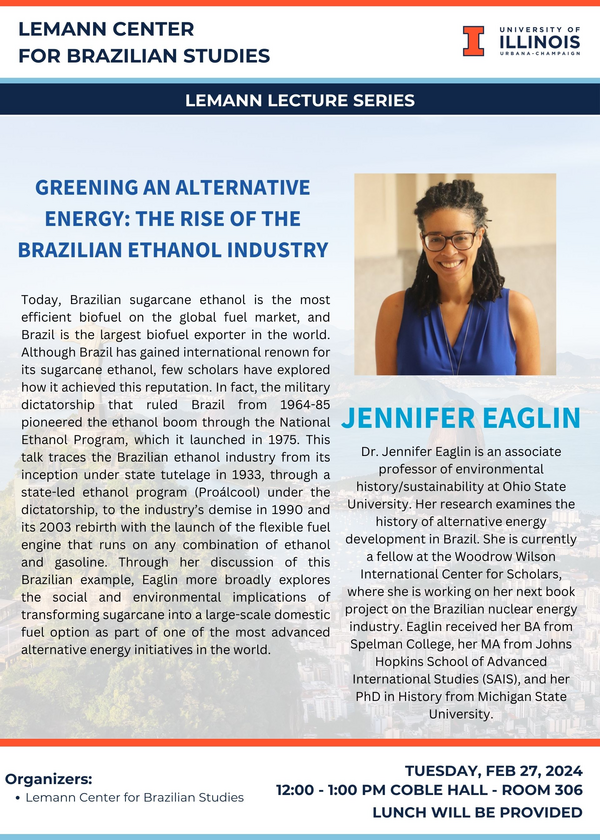
Lemann Lecture Series | Jennifer Eaglin | Greening an Alternative Energy: The Rise of the Brazilian Ethanol Industry
- Event Type
- Lecture
- Sponsor
- The Lemann Center for Brazilian Studies
- Location
- Coble Hall 306
- Date
- Feb 27, 2024 12:00 - 1:00 pm
- Speaker
- Dr. Jennifer Eaglin is an associate professor of environmental history/sustainability at Ohio State University. Her research examines the history of alternative energy development in Brazil. Eaglin’s first book, Sweet Fuel: A Political and Environmental History of Brazilian Ethanol (Oxford University Press, 2022), explores the history of Brazilian sugar-based ethanol development from the 1930s to the 2000s and the associated environmental and social costs that accompanied the industry’s growth. She is currently a fellow at the Woodrow Wilson International Center for Scholars, where she is working on her next book project on the Brazilian nuclear energy industry. Eaglin received her BA from Spelman College, her MA from Johns Hopkins School of Advanced International Studies (SAIS), and her PhD in History from Michigan State University.
- Contact
- Lemann Center
- lemann@illinois.edu
- Views
- 181
- Originating Calendar
- Lemann Center Events
Today, Brazilian sugarcane ethanol is the most efficient biofuel on the global fuel market, and Brazil is the largest biofuel exporter in the world. Although Brazil has gained international renown for its sugarcane ethanol, few scholars have explored how it achieved this reputation. In fact, the military dictatorship that ruled Brazil from 1964-85 pioneered the ethanol boom through the National Ethanol Program, which it launched in 1975. This talk traces the Brazilian ethanol industry from its inception under state tutelage in 1933, through a state-led ethanol program (Proálcool) under the dictatorship, to the industry’s demise in 1990 and its 2003 rebirth with the launch of the flexible fuel engine that runs on any combination of ethanol and gasoline. Through her discussion of this Brazilian example, Eaglin more broadly explores the social and environmental implications of transforming sugarcane into a large-scale domestic fuel option as part of one of the most advanced alternative energy initiatives in the world.